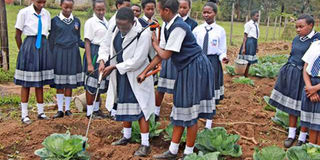Schools live the farming dream

Lilian Wangare farm manager at Jomo Kenyatta Boys High School in Nakuru showing various agricultural projects of tomatoes and livestock carried out in the school. PHOTO |RICHARD MAOSI|NMG
What you need to know:
- The school, which sits on 54 acres and has a population of 1,600 students, hosts a dairy unit, fish ponds, greenhouses and vegetables, projects that sit on four acres.
- They currently have 600 tomato plants, with each producing 30 fruits a season.
- They also plant and make their own feeds that include dairy meal to cut production costs.
From afar, one can spot greenhouses and hear cows mooing as they enter Jomo Kenyatta Boys High School in Bahati, Nakuru.
The school, which sits on 54 acres and has a population of 1,600 students, hosts a dairy unit, fish ponds, greenhouses and vegetables, projects that sit on four acres.
Inside the greenhouses are tomatoes, coriander and capsicum. Further ahead in the fields, the school cultivates cabbages, onions and sukuma wiki.
Farm manager Lilian Wangare says they started farming in 2015, mainly to cut costs.
“Prices of vegetables and milk had really gone up, which threatened our sustainability. At one point, we bought a crate of tomatoes at Sh6,000, which was very high, considering that we operate under a tight budget,” she says.
Various farm projects
The school invested Sh500,000 in the various farm projects, she adds.
At the tomato unit, they grow Anna F1 variety using drip irrigation. “Every week we harvest 150kg of tomatoes, which is more than what we need. We sell the surplus, including to supermarkets and hotels in Nakuru town,” she says.
They currently have 600 tomato plants, with each producing 30 fruits a season.
The school also rears 61 dairy cows that consist of milkers, heifers, bulls and calves, which they keep under zero-grazing.
“Currently, we are milking 19 cows that produce 270 litres per day,” says Wangari, adding, the milk is used for making tea for students, teachers and support staff, with the surplus sold to the local community. Sales earn the school Sh12,000 a week.
They plant and make their own feeds that include dairy meal to cut production costs.
“We make the feed from sorghum, hay, cotton seeds, wheat pollard, lime, maize germ, and sunflower cake,” Wangari says, adding that manure from the cows is used on the crop farm.
George Muchendu, the school’s deputy principal, says farming has enabled them save Sh300,000 per month on food as students acquire skills to produce food.
A learning centre
“I believe that with the farm projects, we’re in tandem with the new curriculum because as schools, we’re supposed to equip students with important skills like farming.”
At the nearby girls’ section, Paul Waithaka, the agriculture teacher, says they started farming in 2016, after the school was split into two.
The girls’ institution sits on 12 acres and grows cabbages, sukuma wiki and coriander on four. The farm produces food for the school and acts as a learning centre for students.
“We are now able to feed our students from food that we generate without having to pay even a coin,” he says, noting they save Sh150,000 per term on food.
Last season, they produced cabbages weighing an average of 10-11kg each, and this season they are aiming for an even bigger harvest.
Hassan Kimani, the head girl and an agriculture student, says the farming projects have enabled them know how to tend to crops.
“Previously, I did not know how to plant crops since I was raised in an urban area. It feels good that I’ve acquired farming skills, which I will use for a long time.”
Each of the 33 agriculture students is assigned small portions of land to grow crops, which, she says, must do well as they’re given marks.
“Through the farming skills, we will create jobs in future,” she says.
Nakuru County agriculture chief officer Joel Maina says through farming, schools train students on how to farm, equipping them with skills while generating income and cutting costs.





